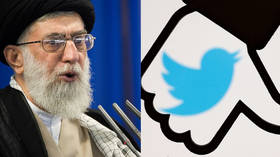Selective censure? Twitter hides Iranian leader's post citing Rushdie fatwa in rare policy move

Twitter has said it hid a tweet attributed to the Iranian supreme leader, which cited an execution order, in line with its anti-violence rules. It has previously faced wrath for sparing US President Donald Trump similar censure.
The micro-blogging service confirmed on Friday that it had enforced its policy against violent threats and glorification of violence on the platform, when it made inaccessible a tweet by @khamenei_ir, an account that is widely associated with Iran's Supreme Leader Ayatollah Ali Khamenei
Although lacking the blue tick of a verified account, it boasts almost 550,000 followers and posts "regular updates and news" from Khamenei. The account occasionally posts links to Khamenei's speeches, official photos, as well as statements on foreign and domestic policy.
Also on rt.com Iranian photographer whose image Trump used to attack Iran says it's a 'great shame' for herKhamenei, assuming he is the one behind the account, never pulls punches in berating Iran's enemies. For instance, he wished death on "the American politicians currently in power," namely US President Donald Trump, White House National Security Advisor John Bolton, and Secretary of State Mike Pompeo. However, this was not the tweet that landed him in trouble.
"Down with USA" means down with @realDonaldTrump , @AmbJohnBolton and @SecPompeo . It means death to the American politicians currently in power. It means death to the few people running that country; we have nothing against the American nation. pic.twitter.com/cq1TBZY9FR
— Khamenei.ir (@khamenei_ir) February 8, 2019
While the anti-Trump diatribe is currently accessible, having been retweeted more than 2,400 times, a tweet referencing the 1989 fatwa against famed Iranian novelist Salman Rushdie is not.
The February 14, 1989 fatwa, a non-binding legislative opinion in Islamic law, was issued by Khamenei's predecessor, Ayatollah Khomeini, who was supreme leader of Iran until his death in 1989. It instructed Muslims to execute Rushdie, who was accused of blasphemy in Iran over his controversial novel 'The Satanic Verses.'
In the tweet that marked the order's anniversary and was flagged by Twitter, Khamenei wrote that the "verdict" on Rushdie was "based on divine verses and just like divine verses, it is solid and irrevocable."
. @Twitter has removed @khamenei_ir tweet #Iranpic.twitter.com/i6wcAhts1m
— Dudi Cøhen (@dudi_cohen) February 16, 2019
The tweet has irked Iranian activists, who called on Twitter CEO Jack Dorsey to yank the account for good over its "clear call for violence."
.@Jack@TwitterSupport#IranWhy has @twitter not shut down this account (khamenie_ir)?Is this not a clear call for violence?@RudyGiuliani@POTUS@realDonaldTrump@SecPompeo@VPpic.twitter.com/2LgdtJhukm
— Hamid Azimi (@no2censorship) February 15, 2019
We talk a lot about hypothetical Twitter bans for world leaders, but Khamenei's account is promoting a bounty on Salman Rushdie's head. Does that violate Twitter's TOS? cc:@jackhttps://t.co/40kwSw7xFP
— Josh Billinson (@jbillinson) February 15, 2019
Twitter, however, didn't go as far as banning @khamenei_ir altogether, but made the tweet invisible and placed the account in read-only mode.
"It's against our rules to make specific threats of violence or wish for the serious physical harm, death, or disease of an individual or group of people," a spokesman for the service told BuzzFeed, explaining the move.
The ban on new posts can only be lifted if the tweet is deleted by the user. As of now, the last post from @khamenei_ir is dated February 14, meaning it had not posted any new tweets since then.
While many applauded Twitter's move, there were those who saw it as disproportionate, with one commentator pointing out that "no direct threat was made."
Fuck you @twitter. But I am going to retweet the censored tweet by @khamenei_ir which merely quotes Ayatollah Khamenei in 1990 as stating that the #fatwa of #Khomeini cannot be reversed. It is disgraceful that you demanded the tweet be deleted when no threat was made in it. pic.twitter.com/1vOQrESU9A
— Joseph H Bozorgmehr (@Joe_Bozorgmehr) February 16, 2019
No. It is the expression of an opinion that @SalmanRushdie should be killed, it isn't a "murder contract". The tweet by @khamenei_ir quotes #Khamenei in 1990 as stating that the #fatwa is based on #Islamic law and is irrevocable. No direct threat against Mr. Rushdie was made. pic.twitter.com/XKUhW6lvcU
— Joseph H Bozorgmehr (@Joe_Bozorgmehr) February 16, 2019
According to Twitter's policy, such punishment applies to accounts that glorify violence, such as "mass murders,""terrorist attacks," as well as "rapes and sexual assaults." That is not an exhaustive list, and Twitter says it also prohibits "the glorification of violence where protected categories have been the primary target or victim."
The guide cites notable exemptions from such policy, which includes "state-sanctioned executions." While it might appear to be the case with Rushdie, Twitter made sure it has the final say anyway, reserving the right to "take enforcement action."
The social media giant has previously been criticized for its selective approach to the treatment of calls for violence and hate speech. The debate has been fueled by a series of war-mongering statements tweeted by Trump, in which he threatened North Korea with "fire and fury" and Iran with "consequences the likes of which few throughout history have ever suffered before" in an all-caps tweet.
To Iranian President Rouhani: NEVER, EVER THREATEN THE UNITED STATES AGAIN OR YOU WILL SUFFER CONSEQUENCES THE LIKES OF WHICH FEW THROUGHOUT HISTORY HAVE EVER SUFFERED BEFORE. WE ARE NO LONGER A COUNTRY THAT WILL STAND FOR YOUR DEMENTED WORDS OF VIOLENCE & DEATH. BE CAUTIOUS!
— Donald J. Trump (@realDonaldTrump) July 23, 2018
With calls mounting to ban Trump from his favorite medium, Twitter rolled out a code of conduct applicable only to world leaders, much softer than its standard rules.
"Blocking a world leader from Twitter or removing their controversial Tweets would hide important information people should be able to see and debate. It would also not silence that leader, but it would certainly hamper necessary discussion around their words and actions," it said at the time.
Think your friends would be interested? Share this story!















